“I think they forgot how hard homework is,” said Zachary. Some of his classmates laughed, but his eyes had a resolve that told me he was serious. Fifth grade can be tough, and Zachary was right in the midst of an especially challenging stretch. He opened up about how tough the school year had been so far. He was feeling that his parents, and even his teacher who was in the room as he said these words, didn’t understand the difficulties of maneuvering everyday life as a fifth grader. There might’ve been a time when they had been in similar shoes and felt these struggles. However, that time had passed, they’d forgotten it, and Zachary wasn’t going to take it.
A few of his classmates chimed in with “Yeah!” and “Mmm-hmm!” It was like being part of a lively town hall or a spirited church service. His words about homework had struck a nerve. The students began talking about all the ways the grownups around them had forgotten the difficulties of being a kid. They spoke of feeling misunderstood and stretched thin. I wanted to laugh as they mentioned the stresses of doing small household chores. Cleaning their rooms and putting away laundry didn’t seem to merit the sort of passionate frustration they were showing. I wanted to tell them about what they had to look forward to, with income taxes and health insurance and having to constantly unsubscribe from email lists. Yet as they spoke, I felt distant memories of similar feelings I’d once had.
I was in elementary school the first time I heard rap duo DJ Jazzy Jeff and the Fresh Prince. It was a music video for their song “Parents Just Don’t Understand.”* It’s funny to think now, but I sat there as an elementary school kid in the Deep South. My circumstances could not have been further from those of these two West Philadelphia rappers. Yet as I listened to that song I remember nodding my head and thinking, These guys get me.

Now, I was finding that somehow I’d become the kind of person DJ Jazzy Jeff and the Fresh Prince rapped about. One boy named Benny said, “I can’t believe my grandma was ever a kid.” From what I gathered, he and his siblings lived with this grandmother. She apparently expected a lot from them. “She’s all the time giving us work to do and getting on me about grades.” When I suggested to him that she likely did all these things out of love, he knit his eyebrows. The perplexed expression informed me that I was now a grownup who did not understand.

One thing I’ve found to be true is that all great grownups are simply trying to communicate love. Sometimes this love is spoken by teaching responsibility or nurturing growth through challenges. Sometimes with words. Sometimes with hugs. Often, though, this love doesn’t translate, as different generations can seem to speak different languages. For these jumbled attempts at getting love to reach its mark, it takes a patient and persistent messenger.
When we’re children, we communicate like musicians who are still learning to play their instruments. Imagine the supremely talented Louis Armstrong with a song fully formed inside him, yet with no way of bringing it out into the world. We hit the wrong notes and play in the wrong key. Sometimes we can’t even find our trumpet.
Surrounded by kids, I began to remember this feeling well. I’d been a kid who had cheered and complained. I’d whined and I’d thrown fits. Sometimes I actually did these things at the appropriate times.
We might’ve forgotten it, but we all once spoke the language of children fluently. We were all once small and fumbled to find the proper ways of expressing the many feelings we felt.
Sometimes it might sound like we grownups now speak a different language than we once did, but children are not that different from us. Children are communicators of love, too. All words and actions—whether they come from children or from grownups—are either a statement of love or a request for love. This was true of all conversations I had in classrooms and, I’m finding, true of all conversations any of us will ever have.
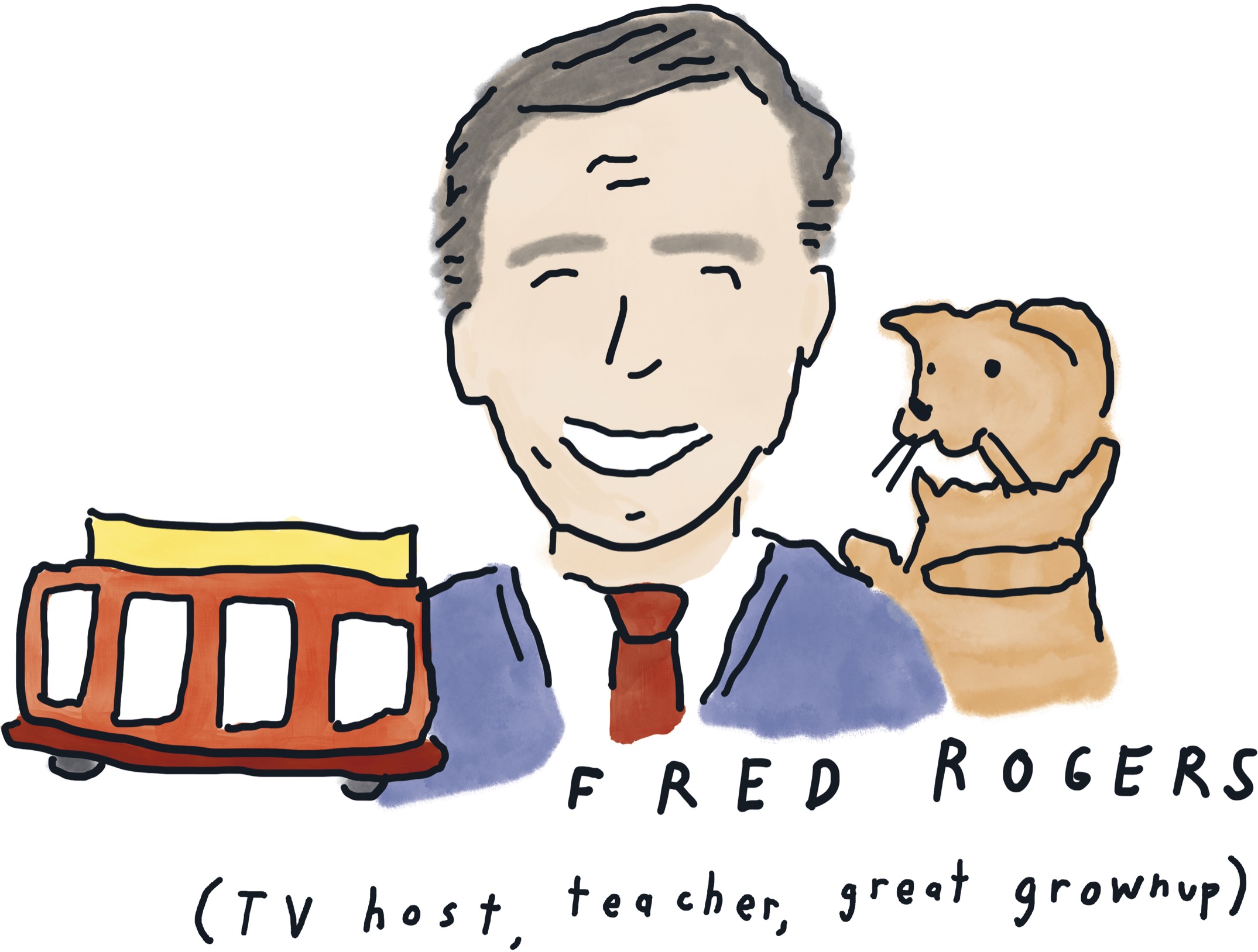
“Love is at the root of everything, all learning, all relationships—love or the lack of it.” Like most of the elemental things I’ve learned in my life, this was taught to me by Fred Rogers. Mister Rogers’ Neighborhood was a staple of my earliest childhood.
For years I thought he was speaking directly to me. I’ve since learned that was part of his gift, as millions of other children felt the exact same way. By seeing how he proceeded through life in our daily television neighborhood visits, I gained a better understanding of how I fit locally in my neighborhood—just by being me. As I’ve grown, I’ve come to understand it has equal bearing on how I move in the world as a global neighbor.
Mister Rogers was teaching me when I was 3 years old and will likely continue to be teaching me should I live to be 103 years old. Even with having “outgrown” his television show many years ago, I’ve stayed an active admirer and student of his work by seeking out anything he ever did. From speeches to television appearances, I’ve devoured it all.
One day I happened upon something surprising. I found out that Fred wrote a chapter in a medical book titled Duane’s Ophthalmology. Yes, Mister Rogers wrote a chapter in a giant book for ophthalmologists. So I hunted it down on eBay. When the massive thing arrived in the mail, I immediately sought out Fred’s words. The chapter title? “Physical and Psychological Preparation of Children for Anesthesia and Surgery.” Never had I imagined I’d read something like this on purpose.
What could he possibly say that these doctors hadn’t already learned in medical school? What would he add to this very technical book? A workday for Mister Rogers was singing little songs and playing with puppets. What could this host of a preschool television show have to share with real-life doctors and surgeons?
His chapter begins with this line:
“You were a child once, too.”
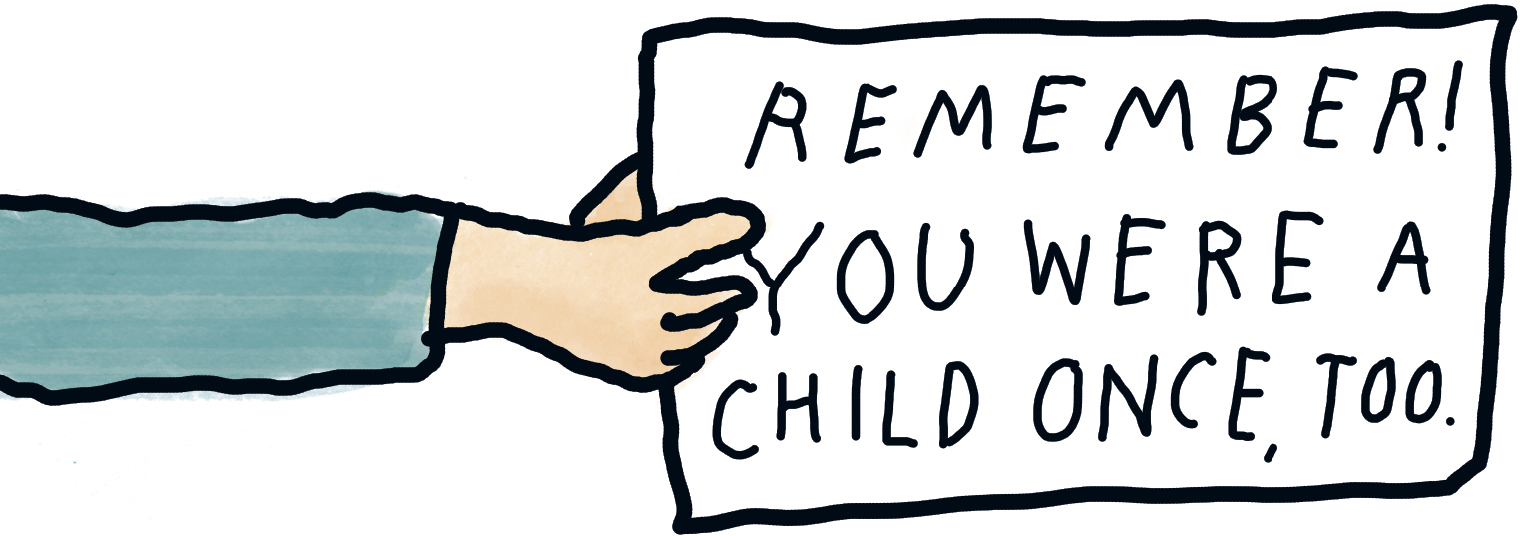
You were a child once, too. This small statement might seem glaringly obvious at first reading. It’s something we all know. Of course, we were all once children. Yet, reading it again, I was struck by his invitation to remember. It seemed to me an audaciously simple thing to write in a book aimed at medical professionals, or in any book at all.
Could those doctors working on young children serve them better by remembering that they, too, were once children? By recalling the feelings and emotions of being small and unprotected, would they perform their medical work in a kinder, gentler way? Could this be the key to being not just a better ophthalmologist but also a better grownup?
Sure, they have training. Certainly, they have expertise. Somehow, though, this straightforward appeal to reflect on the child they once were, could—in his estimation—be transformative. It suggests placing yourself in these children’s shoes. These are smaller shoes, yet similar to ones you might’ve worn not too long ago. It proposes having the imagination to recall what it might’ve felt like to be in those smaller shoes and the needs, fears, and longings that come with them.
Maybe that’s part of why Mister Rogers began every episode of his television show putting on sneakers. He would walk into the room singing his song, change into a sweater, take off his dress shoes, and put on a pair of casual sneakers. Repeatedly putting on different shoes, modeling for us what it’s like to place ourselves in a different perspective. Every time he spoke he was appealing to us all to see everything in a new way. For ophthalmologists, that’s exactly what they’re working to do: Help others see. With his exquisite humility, that’s exactly what all Fred’s work did, too.
Just as these doctors would be standing before young patients, medical instruments in hand, we now stand in our respective stations of life. We are the grownups in the room. There are needs around us and there is work to be done. Reflecting on the children we once were could give us great clarity in how we serve the children who now surround us—and the grownups, too. We, after all, were once young, too.

Thinking this way would cause us to rethink everything. We would reimagine how communities are built and how classrooms are structured. We would take great effort to create nourishing stories for screens of all types. We would elevate how we work with and for children in all fields. We’d begin to see every person of any age with more compassionate eyes, realizing that they, like us, were once young, vulnerable, and in need of loving care.
One of the earliest projects my wife and I did together explored this idea. We wanted to see what might happen if we allowed adults to relive childhood memories. Kristi posted a few words online asking friends to share some of their most beloved life moments. Then, in a bit of playful fun, using cardboard, glue, yarn, and markers, we made it our job to re-create those moments as best we could. Time travel on a budget.
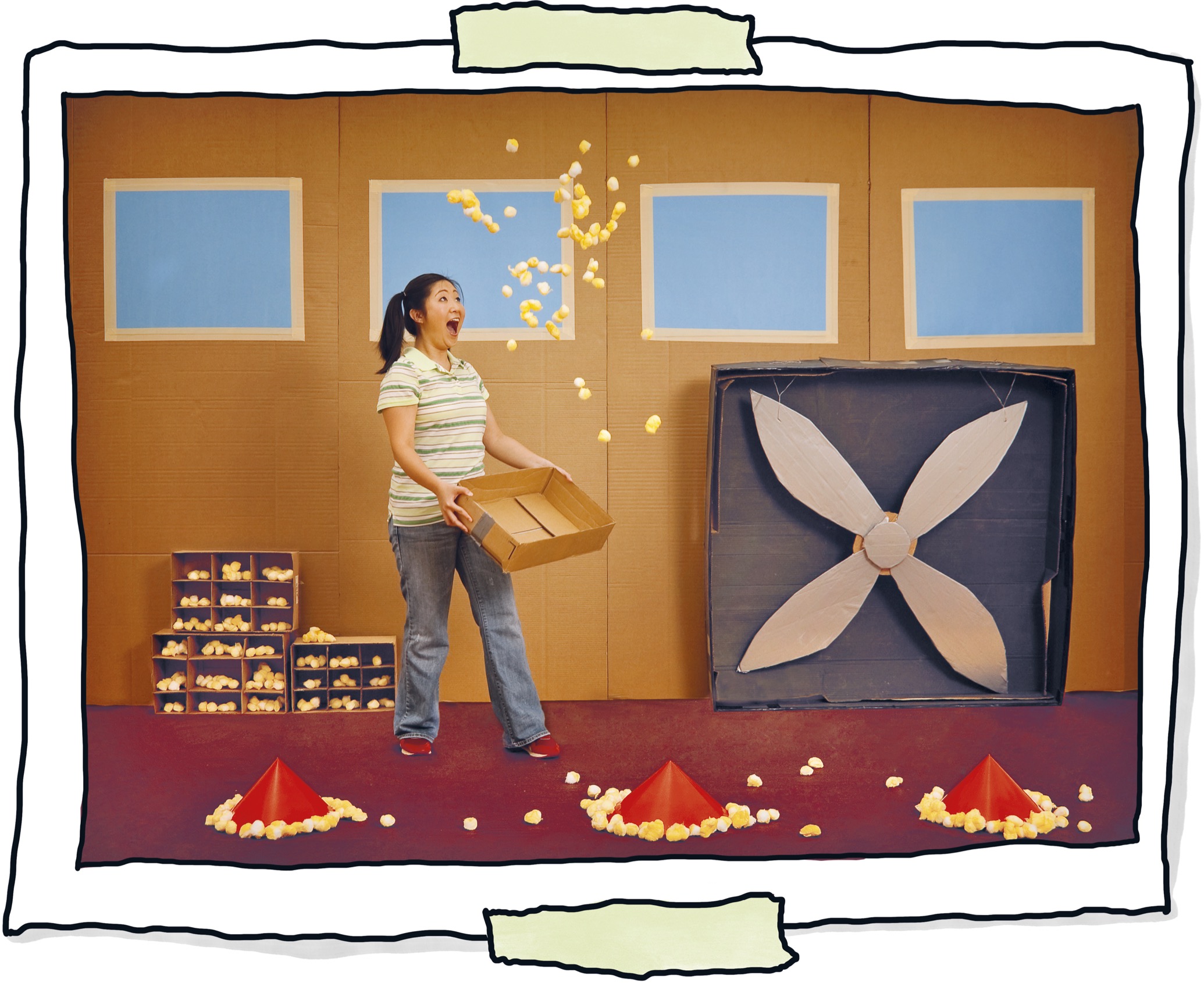
Sasha: “When I was a little girl, I loved visiting my nana. She owns a chicken farm and I used to love helping her unload chickens when the Tyson truck brought them in. There was a big fan near the windows to keep them cool, so when we’d unload the pallets, tons of baby chicks would fly everywhere.”
Kim: “One of my favorite memories is my first day of kindergarten. I wore a blue-and-white-striped dress and had a purple backpack. My hair was in a side ponytail and I remember thinking the bus was huge. I was so excited.”


Chuck: “When I was really little, I used to take all the Tupperware out of my mom’s kitchen cabinet and crawl inside to play. I loved just sitting in there by myself.”

Colton: “When I was four, I climbed inside a laundry basket and rode it down the stairs like a roller coaster. The ride was awesome . . . the ending was terrible.”
There was laughing. There were tears. Cheap crafting materials, which they likely played with as kids, had somehow come together to bring them to a moment from long ago. With what was—at first glance—a very silly photo project, they entered into these cardboard reconstructions with a profound reverence. Each person stood reunited with a magical moment from their childhood. That moment might have gone, but the children in them were very much still alive. We could always tell by their glowing faces.
In describing memory, Oscar Wilde said it’s the “diary that we all carry about with us.” I think some of our pages are always easily accessible. These are light and cheery places we can visit at any time. These are the dog-eared pages that take us to a rose-tinted ideal of what our childhood was or could’ve been. These are the memories we readily share as anecdotes about growing up and the ones we’d love to have re-created for us out of cardboard and string so we could relive them and play again.
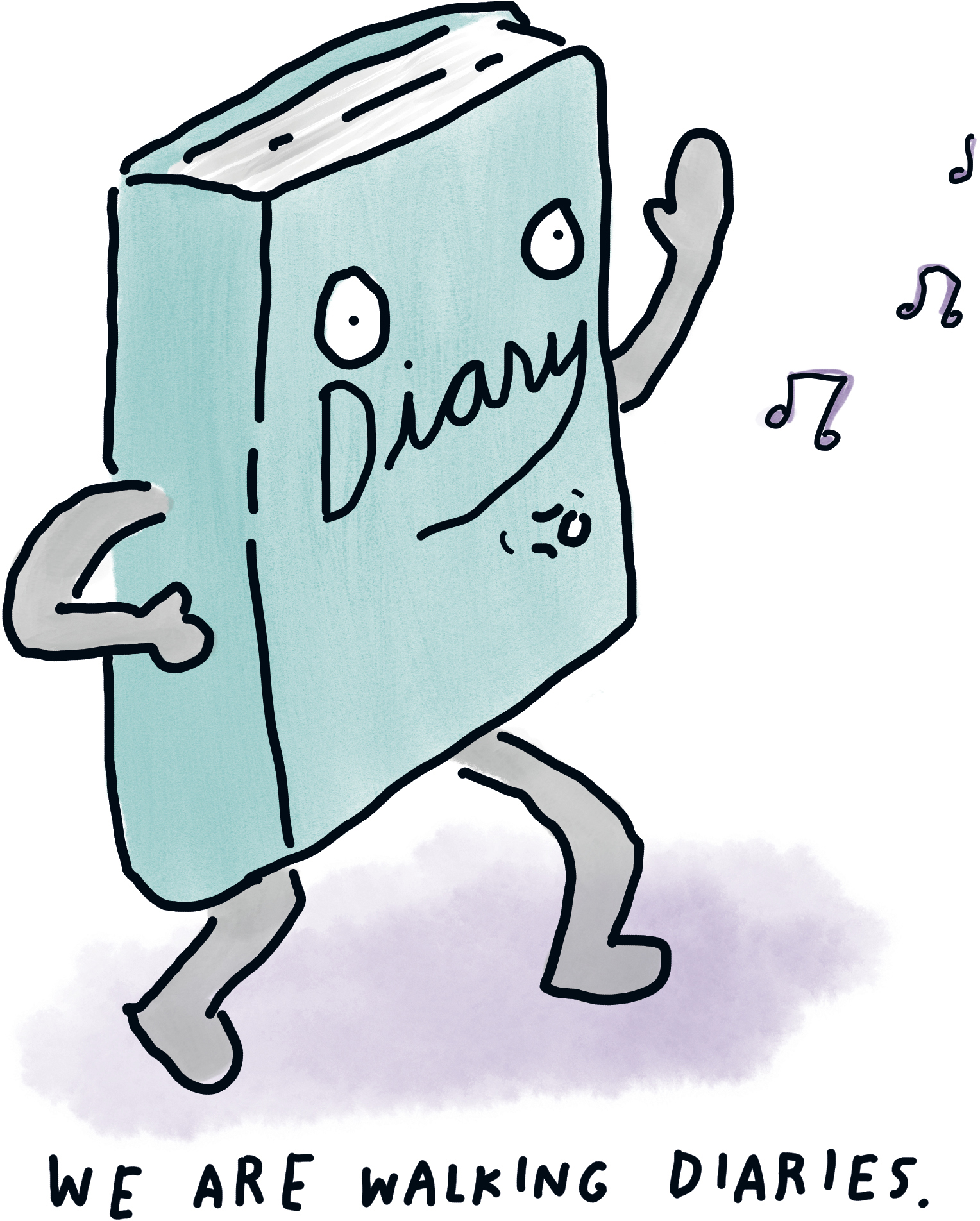
Of course, these diaries we carry around also contain heavy and tragic memories. Be it the loss of a loved one or a traumatic event of any kind, these pages contain shock, strain, and stress. Unpleasant to visit as they may be, they are significant entries we shouldn’t erase. These take us to a turning point where life shifted. Sometimes these are the parts where we say we had to “grow up.” They are chapters in our story we might not like to reread, but we know very well the ripple of impact they’ve had on every word and sentence of our lives since.
All of us have even more memories beyond the ones we can easily bring to mind. I don’t suggest or recommend living in the past. This is, after all, a book about growing up, which should involve moving forward. I do believe, though, in the importance of remembering and understanding how our pasts have helped bring us into our present, wherever that may be.
We get knocked around and tossed about. The demands of daily life thrust us forward in time. Like we’re on a fast-moving treadmill and stubbornly refusing to slow down, we keep going. Along the way, we pick up nicks and bruises but keep moving forward anyway. This is, after all, what is demanded of us. Forward motion is what we do. We pick ourselves up and we get on with life.
Over time, though, the dings and scrapes accumulate. We find ourselves forgetting where that bruise came from or why that scar is there. We can’t quite remember where we picked up that desperate need for approval. Some of the larger scars we, of course, can recall with vivid detail. The rest, the blurry little hurts, those have added up through the years to simply become part of who we are, even though they hold us back from becoming who we’re meant to become.

After my time at the Guggenheim, I found myself having more energy. I’d continued seeing a counselor, who started noticing the same thing. I was definitely more upbeat than I’d been when this journey had started. She’d been the one who’d originally encouraged me to slow down my schedule. Counseling and self-care had been completely new concepts to me, but thanks to them I was now beginning to feel a considerable fog lifting. Gradually I’d begun taking on small directing and writing jobs, while also continuing my visits with classrooms. I also, to my surprise, became more comfortable with the idea of speaking to audiences who weren’t children.
All throughout my Listening Tour I’d promised kids that I would find a way to share their messages with grownups. So, when a group of doctors invited me to share what they could learn from children, I jumped at the chance. While questioning what I should say, I immediately remembered the words of Mister Rogers. I thought of his gentle call to those ophthalmologists so many years ago. Instead of trying to impress them with surgical experience I didn’t have, I’d share with them his plain admonition to look back and focus on this truth: “You were once a child, too.”
My confidence in sharing these simple words began to wane as I looked out at the audience from backstage. The auditorium seats were filled with brilliant men and women who had dedicated their lives to the medical profession. I was a writer and director of silly things for kids. It was too late for a rewrite, so I would have to proceed with what I’d prepared. Though my voice shook, I shared kids’ stories. I shared their hopes. I shared Fred’s invitation to remember. As I did, I began to realize just how much I believed in its importance deep in my bones. A passion I’d lost had been rediscovered and, in spite of all my nervousness, the message resonated.
I wrote down the words of one man who spoke with me afterward because I knew I would need to always remember them. He was the kind of well-dressed doctor type that I’d always assumed had all the answers. Had he and I passed each other on the street or in an elevator, I would have thought we’d have little in common. Yet there I stood, washing my hands in the men’s room, and there he stood with tears in his eyes.
He described to me a day when his network of hospitals had asked everyone to bring in a childhood photo. It was supposed to be a lighthearted workplace get-to-know-you sort of thing, but became way more. His mother had sent him an old photograph of himself from when he was five years old. It had been taken in a department store and he was wearing a winter coat.

Of course there were many obvious differences between the adult standing in the bathroom and the child in the photo. He’d gotten taller. He’d lost hair. Also, at age five he didn’t have a mustache. The profound moment for him came when he looked closely at the photo and into his own eyes. They were the same eyes he still had now, except with one major difference: Now they weren’t as open. Through tears, he kept repeating the question, “Where’d that kid go? Where’d that kid go?”
I wrote his question down and think of it often. Anytime I find myself with someone vastly different from me, I can always go back to that question. Somewhere inside them is still a child. We’re all united by the fact that we’ve been children. Maybe what separates us is that some of us have forgotten this.
There’s something else Mister Rogers said: “The child is in me still and sometimes not so still.”
While we’re on the topic of Mister Rogers, may I share something with you? Throughout this project, many inexplicable things happened, and this one took my breath away. I’d begun sharing this message of becoming a better grownup by becoming more like children—to doctors, educators, parents, and anyone else who would listen. One day I received a message from the Fred Rogers Center. Dramatic pause. Zoom in to see Brad screaming. Zoom out to an image of the world in which you can hear Brad screaming.
The Fred Rogers Center was holding an event for people who work in children’s media to discuss how the spirit of Fred’s work could continue in the world today. For this event they were asking me to share a few words. You could’ve powered an entire city with the boost I got in that moment.
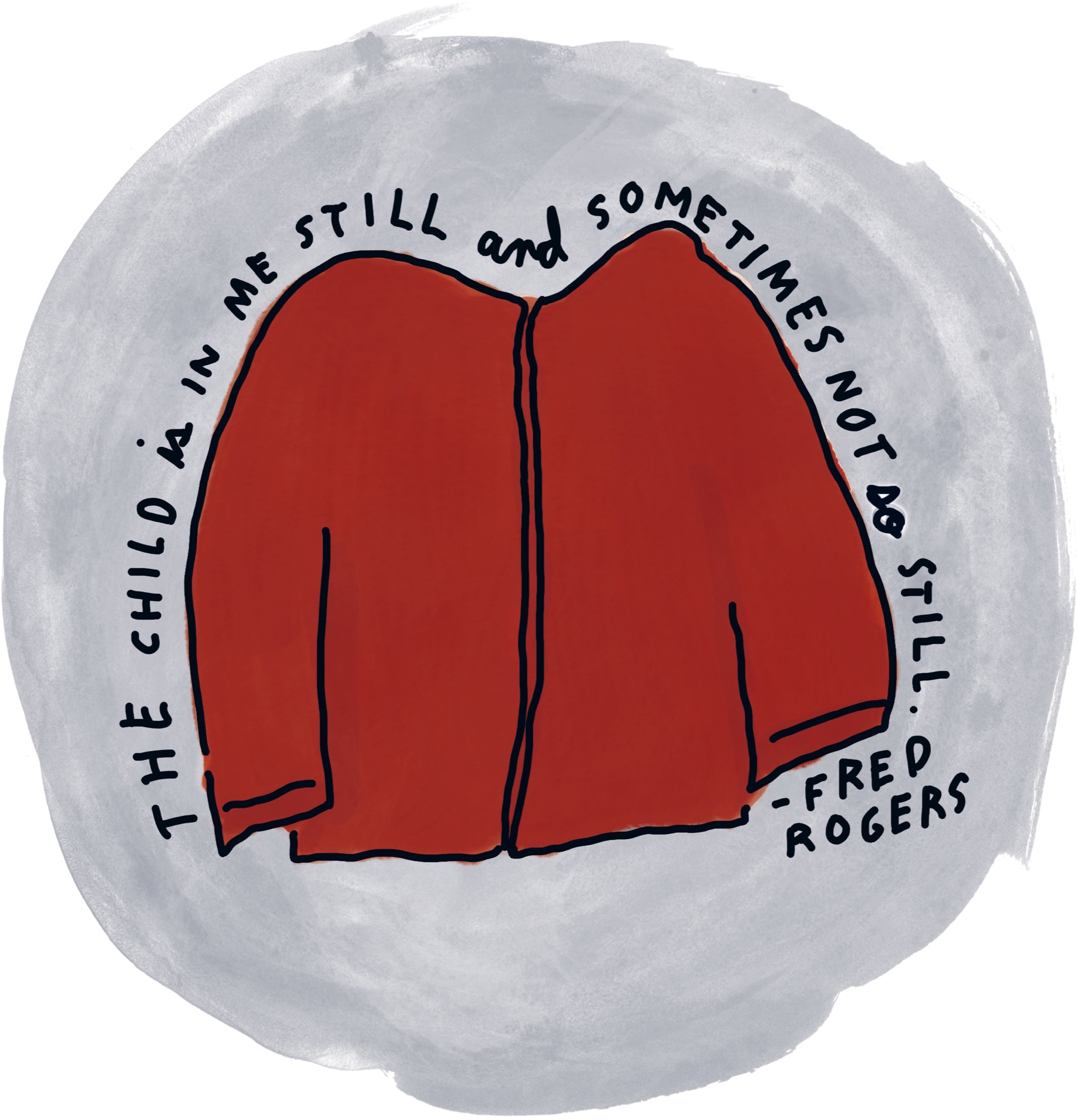
The Fred Rogers Center is in Latrobe, Pennsylvania, where Fred grew up. So, in a way, it’s the original Mister Rogers’ neighborhood. The Fred Rogers Center is tucked away in a quiet part of town, and every corner holds some historic piece of his story. I was allowed to spend time in the archives, where I devoured letters, speeches, and scripts. I got to meet Joanne Rogers, Fred’s wife of nearly fifty-one years. Best of all, she hugged me and told me I was special. I’m fairly certain I flew.
I struggled with how to share something at this event that might match the honor I felt or the respect I held for his work. That is, until I remembered Fred’s very own words in the book for ophthalmologists. Just as I’d shared them before with the medical community, I’d do the same for these children’s-media professionals. It seemed fitting to continue the tradition and make the anchoring point of my talk those little words: “You were a child once, too.”
While the response was kind, I never could have predicted what happened next. Afterward, a woman approached me and introduced herself. Her name was Hedda Sharapan, and she’d worked on Mister Rogers’ Neighborhood from the very beginning. I recognized her immediately but tried with all my might to play it cool.
“I have to tell you something,” she said with a stunned look.
She explained how she’d started working for Fred shortly after graduating from college. Her work on the television show evolved over time and often took many forms. As the show grew, Hedda’s role transformed, and she became an irreplaceable part of the team. Sometimes she’d work with curriculum, sometimes she’d work in research, and sometimes she’d assist in writing. Once, during a particularly busy season, she was tasked with helping research a chapter Fred had been asked to write. It was going to be included in a book for ophthalmologists—the same book, Duane’s Ophthalmology, that I’d discovered all those years ago and had just spoken about from the stage.
Hedda grew emotional as she told me about how she wrote this chapter and then passed it on to Fred for his review.
“His standards were so high. His work was so meaningful that whenever I presented anything to him, I really wanted it to be the very best,” she told me.
Oftentimes she’d send him things and preemptively write at the top “for your revision.” Fred didn’t like that word, as it seemed negative, so she began putting “for your elevation.” This made him laugh, but at the same time gave a perfect description of what she felt he did for her. He elevated Hedda and her work to an entirely new level. So from then on, when Fred would make notes on her writing, he would sign it, “—your E.O.,” which stood for “your elevator operator.”

“Fred was an incredible appreciator,” she told me. There were times when she felt insecure about what she brought to the small team. Once, after a meeting in which she felt like she’d added nothing, Fred sent over some papers along with a note saying, “Thanks, Hedda. You’re a great synthesizer.” Having just left a meeting in which she’d shared very little, he’d just validated her silence. He knew that she was serving in her own way and was a vital part of that room.
“I thought, you know, it’s okay that I’m not the person on staff who is offering the creative ideas. I am someone who has another role here. It’s a different role, and it’s one that’s appreciated.”
When Fred returned the chapter she’d written for the ophthalmologists, he’d made suggestions throughout, as he often did. But his editing on this particular piece of writing stuck with her, and would now forever stick with me as well. As she looked at the notes, she saw that Fred had done something astonishing. He’d nixed a substantial portion of the beginning and replaced those lengthy opening passages with those six words: “You were a child once, too.”
Hedda and I stood together in stunned silence.
In a book meant for ophthalmologists, I’d found words that shaped me into something better, that had helped me grow, and that I had shared with a room full of people I’d never met. In that room was a woman who heard a reminder of words from a mentor in a talk delivered by a stranger, and just had to let me know. Somehow, extraordinarily, those words “You were a child once, too” had found their way across space and time to connect us both. The elevator operator was still at work.
“He helped me grow,” she said. “Thank you for helping me remember.”
There is a word in Ghana, sankofa, that means to move forward by going backward. Some translate it to mean “go back and get it.” The word is represented in West African culture as a bird. The bird’s feet are firmly planted forward, but its head is turned to look back. In the mouth of the bird is an egg, something precious it has retrieved to carry into the future.
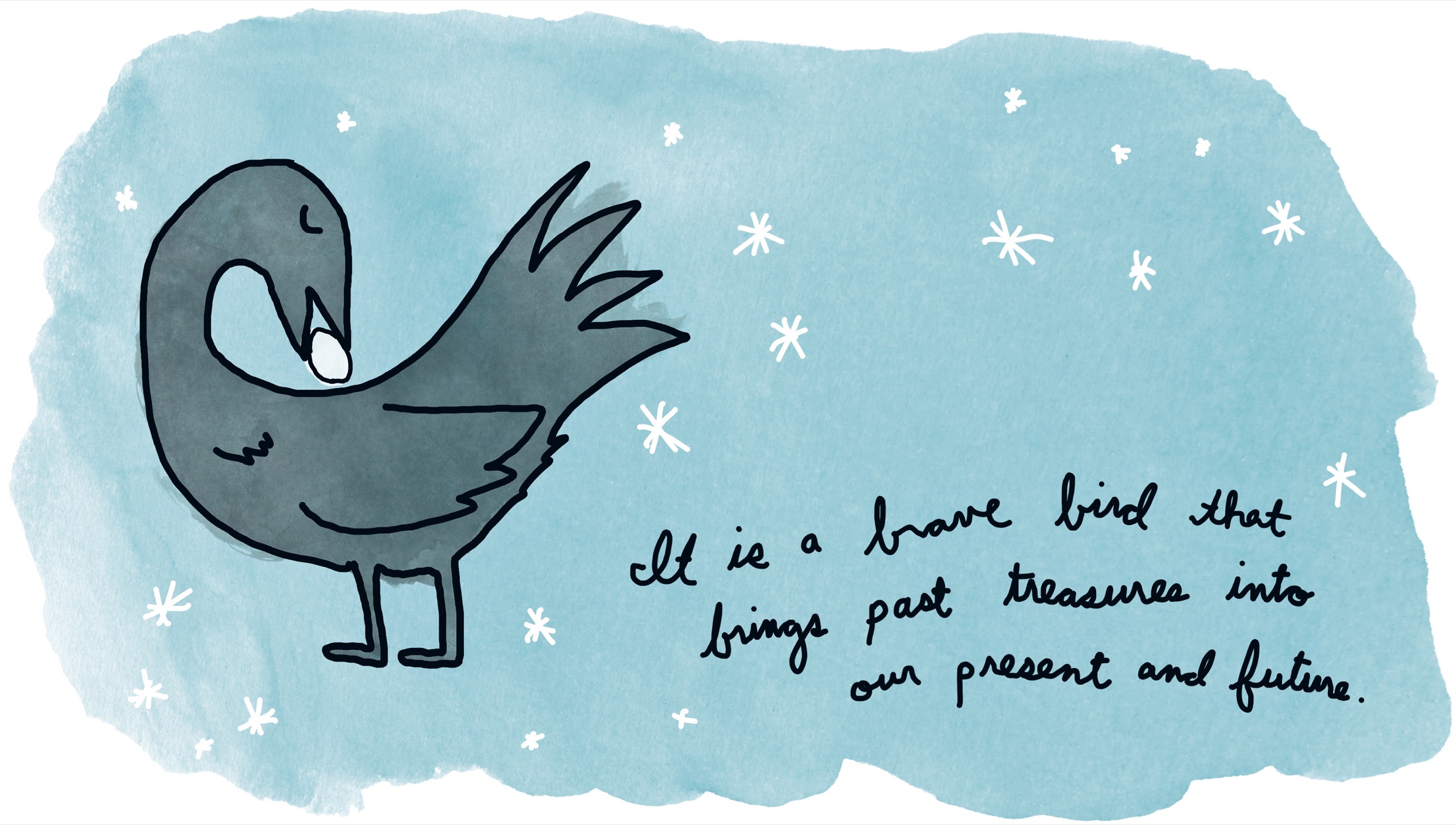
Now and again, we could all benefit from a visit into our pasts. Light could be shed on where our insecurities came from. Where our anger began. Where our joy was lost. Bringing this understanding of who we are into the present can help shape the way we embrace everything. Like this bird bringing something of value from the past into the future, our doing so could allow us to move forward by going backward.
I am grateful for children. However, I am especially grateful for the children I encountered on the Listening Tour. They helped me remember. Through their laughter and their complaints, through their insights and their critiques, these students took me back to a time when I was new. I received the painful and wonderful gift of being able to travel backward in time. This has allowed me to approach all conversations, all relationships, and, especially now, fatherhood—from a place of deep love.
When wondering what in the world we could do for the children around us, better grownups remember. Better grownups remember they were once children, too. Knowing this, they spend their lives as elevator operators, simply lifting the people in their midst to the places they need to be. Time passes. Technology shifts. Trends change. Yet there are basic things all people always need. Maybe tending to those unchanging things can help us change everything.
Once childhood is remembered, the real work becomes not forgetting.